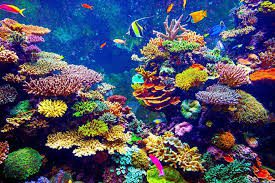Global Issues
How Climate Change Threatens World’s Reefs -By Abubakar, Daniel, Maryam, Rahma & Aisha
The analysis investigates changes in the cover of both live hard coral and algae. Live hard coral cover is a scientifically based indicator of coral reef health, while increases in algae are a widely accepted signal of stress to reefs. Since 1978,when the first data used in the report were collected, there has been a 9 per cent decline in the amount of hard coral worldwide. Between 2010 and 2019, the amount of algae has increased by 20 per cent, corresponding with declines in hard coral cover.

Reports have shown that coral reefs across the world are under relentless stress from warming caused by climate change and other local pressures such as overfishing, unsustainable coastal development and water quality.
The report,the sixth edition produced by the Global Coral Reef Monitoring Network [GCRMN], documents the loss of approximately 14 per cent of the world’s coral since 2009, provides the most detailed scientific picture of date of the toll elevated temperatures have taken on the world’s reef’s.
“Since 2009 we have lost more coral,worldwide, than all the living coral in Australia. We are running out of time: we can reverse losses, but we have to act now. At the upcoming climate conference in Glasgow and biodiversity conference in Kunming, decision makers have an opportunity to show leadership and save our reefs, but only if they are willing to take bold steps. We must not leave future generations to inherit a world without coral.” Said Inger Andersen, Executive Director of the UN Environment Programme[UNEP].
However, the report also found that many of the world’s coral reef’s remain resilient and can recover if conditions allow, providing hope foe the long-term health of coral reef’s if immediate steps are taken to stabilize emissions to curb future warming.
The analysis investigates changes in the cover of both live hard coral and algae. Live hard coral cover is a scientifically based indicator of coral reef health, while increases in algae are a widely accepted signal of stress to reefs. Since 1978,when the first data used in the report were collected, there has been a 9 per cent decline in the amount of hard coral worldwide. Between 2010 and 2019, the amount of algae has increased by 20 per cent, corresponding with declines in hard coral cover.
The report examines the status and friends in the world’s coral reef’s since 1978 and pays special attention to increasingly frequent mass global coral bleaching events, the first of which occurred in 1998. It draws on a global dataset made up of almost 2 million observations from more than 12000 collection sites in 73 countries across the 10 GCRMN regions: Australia, Caribbean, Brazil, East Asian seas, Eastern Tropical Pacific, Pacific, South Asia, Western Indian Ocean, Red Sea and Gulf of Aden and the Regional Organization for the Protection of the Marine Environment [ROPME] sea area which includes The Gulf and the Gulf of Oman.









